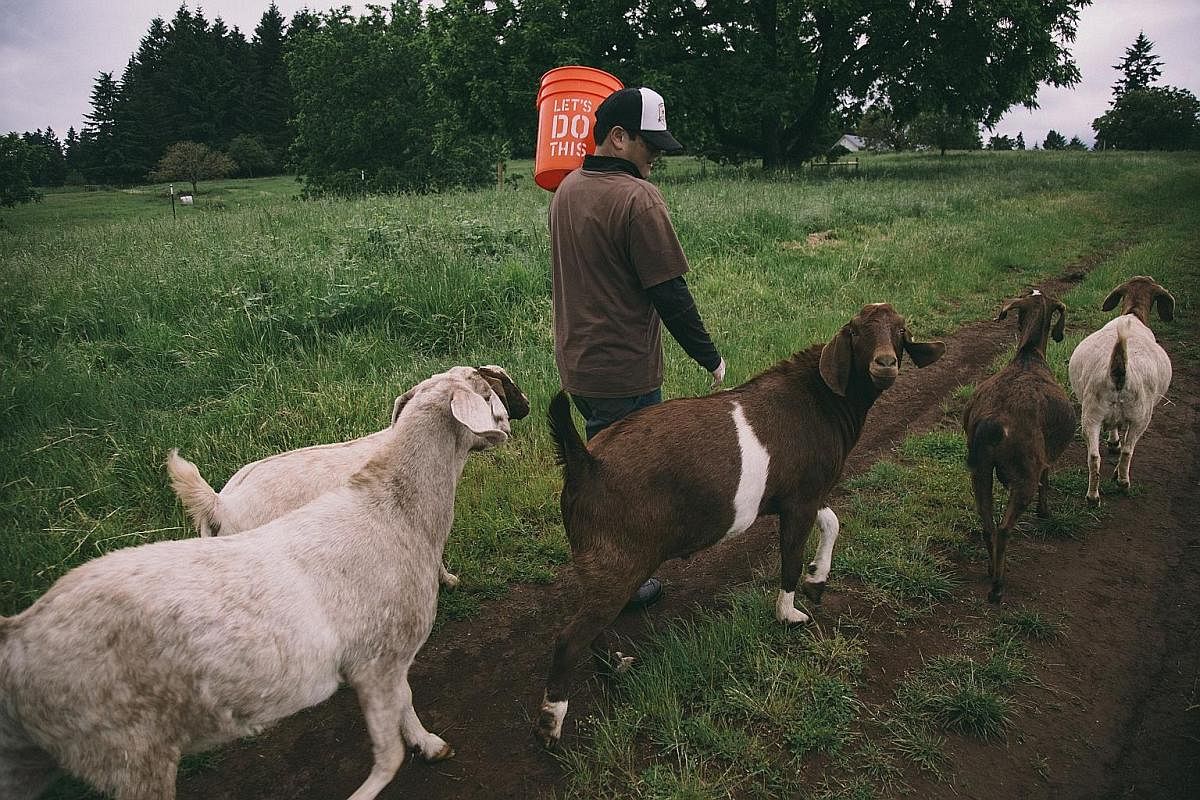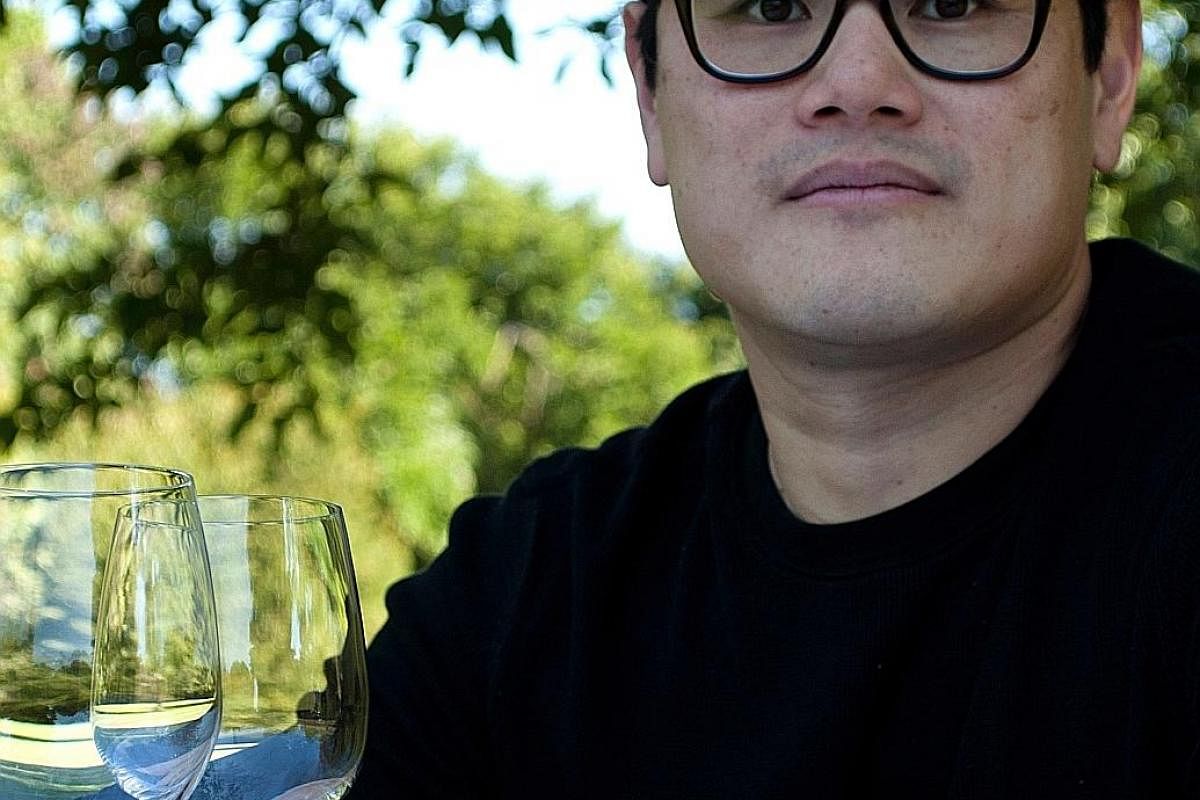Swig
This vineyard's gone to the goats
Vineyard owner Tai-Ran Niew wants to grow grapes with as little intervention as possible so he lets free-roaming goats mow the grass and fertilise the soil


In a vineyard nestled in the northern end of the Willamette Valley in the United States' Oregon wine country, vigneron Tai-Ran Niew personally prunes his vines, surrounded by the wild flora of The Smith Acres, an estate with a 100-year history.
The 49-year-old Brit's 32ha Niew Vineyards is still in its nascent stage.
So far, he has used only 2ha to grow Chardonnay grape vines, which have yet to bear fruit. The vines were planted in the autumn of 2015.
Mr Niew says: "In the future, I will grow Riesling as well, but I want to get the Chardonnay to work first."
He was born in Britain to a Malaysian father and Bruneian mother, who moved to Singapore for work when he was one.
At age 16, he left for England to read aeronautical engineering at the University of Cambridge.
After graduating, he worked in investment banking in Singapore, Hong Kong, London and Beijing for 12 years.
In 2006, he quit his job and took a year-long break.
"When I left investment banking and was thinking of the next thing to do, I ended up spending some time in wine country in California - not because I was interested in wine, but (wine tourism is) just something you can do," he says.
He also travelled to wine country in Australia, France and other parts of the United States. The trips sparked his interest in wine.
"(Wine) is a fascinating subject. It really does combine everything from science and geography to history, philosophy and art. There is so much to it and there is no limit to how much you can learn about it," he says.
He also met acclaimed British wine critic and writer Jancis Robinson in London, who got him involved in writing for a book about American wine.
"Because of the book, I had access to iconic winemakers in the US, whom I talked to and interviewed.
"Through the connections I made, I ended up going to Australia and doing harvest work there and also spent time in Bordeaux and Burgundy in France," he says.
"Once I started doing it, I absolutely fell in love with it."
Taken by the time he spent in the vineyards, he wanted to see how winemaking could become part of a new phase of his life.
He chose Oregon to open a vineyard - partly because his wife, a Chinese national and US permanent resident, was working in Washington, DC - and also because the cool climate mirrors that of wine country in northern Europe, in regions such as Bordeaux, Burgundy, Champagne, Chablis and Northern Rhone.
While California's Sonoma coast wine-growing region is more established, he was drawn to Oregon's smaller scale and, more importantly, the good soil and climate.
He explains: "The soil here is loam, which is almost perfect for growing grapes, especially Chardonnay and Pinot Noir.
"While the chemical composition of the soil is different, it is very similar in physical structure to that of Burgundy."
He also adopts a minimal intervention philosophy for growing and tending to vines - one inspired by the late Japanese farmer and philosopher Masanobu Fukuoka.
It requires him to surrender to the whims of nature instead of imposing on the land with tools, machines or chemicals.
"Underpinning a lot of wine is the idea of terroir and expressing the land. In my mind, the ultimate in expressing the land is if it's (left to grow) wild," he says.
"Can there be anything more natural and expressive of what the land wants to give you than if you don't do anything to it?"
And so he does nothing more than tend to the grass and prune the vines. He does not use pesticides or herbicides and even lets goats, which help mow the grass and fertilise the soil, roam free on his property.
While some vines have died, the rest are mostly thriving, Mr Niew says.
"Right now, it's relatively easy because I have no fruit. But I suspect that when I have fruit, nature will not be so kind and I'll have to ratchet up intervention.
"Even then, it'll be organic or biodynamic."
He expects to see his first fruit next year, but says he will start using fruit only from the 2019 season to make wine. While he waits, there is plenty of preparation to be done to make wine on the site.
"I still need a bottle of wine at the end of it and I have huge faith that I will (produce it)," he says.
In the meantime, he has already made wines elsewhere.
He produced two Bordeaux vintages - a 2010 and a 2014 - called Vigne de Niew, through an organisation that sources grapes from good vineyards in the French wine-growing region and that allows people to make wines without actually owning a chateau.
The wines are a typical Bordeaux blend of Cabernet Sauvignon, Merlot and Cabernet Franc.
While the manual work was handled by a local team, he travelled to Bordeaux to select which plots of fruit went into the wine and carried out the final blending and tasting of the wines.
For instance, the 2014 has fruit from six vineyards.
In Singapore, there are extremely limited bottles of the 2014 available at Praelum Wine Bistro in Duxton Hill.
While he has spent most of his life overseas, the father of a 13-month-old boy still considers himself very much Singaporean.
His extended family is in Singapore and he visits them every year. He also hopes to one day sell wine from his own vineyard here.
"More than achieving scale, I want to make really interesting wine and I hope that the farming philosophy (I follow) leads to a product that people will find interesting and enjoy," he says.
It is also about leaving a legacy for his son.
"In my mind, this project is multi-generational. My son may go off and do other things first, but I hope this (vineyard) will be a part of his life.
"There is something very noble, therapeutic and philosophical about this thing, and I hope he enjoys it too."
Join ST's Telegram channel and get the latest breaking news delivered to you.
A version of this article appeared in the print edition of The Sunday Times on October 01, 2017, with the headline This vineyard's gone to the goats. Subscribe

